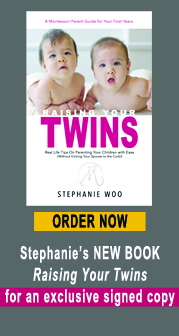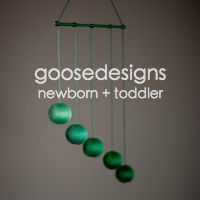Encouraging Bilingualism
I am Chinese and married to an American man who doesn’t speak Chinese. I really want my children to be bilingual, which isn’t easy living in America and surrounded by English-speakers.
My mother Ms. Lam taught me the following on how to raise bilingual children:
From the day they are born, each parent must decide who will speak what language to the baby and stick to it. In my case, my husband speaks to them in English and I speak to them in Chinese. My mom was specific: this means not only speaking to them in Chinese in day-to-day conversation, it also means reading Chinese books and singing Chinese songs. “Not a word of English,” she emphasized. If you start at 6 months, thinking they don’t understand anyway, it’s too late. Children are particularly sensitive to language starting at 2 months and will be able to pick up the mother’s accent if they start hearing it at that age. More precisely-speaking, what they are picking up from the mother is the vowel sounds because it’s those “ahs” “uh” “ooh” that make up a person’s accent. The first six months is the most crucial. Believe it or not, when you try to teach a child a language at 1 year old, it’s already considered a second language!
You can even raise trilingual or quadrilingual children if they are regularly exposed to a third or fourth person who speaks to them exclusively in another language (like a nanny, grandparent, aunts/uncles, etc). Babies are language machines and the ease with which they pick up language at this age is nothing short of a miracle.
My Implementation
Knowing the only chance my children will speak Chinese is if I persevere, I’ve made special effort to speak as much Chinese as possible to them. I cannot sing them my favorite “Sound of Music” songs or read “Good Night Moon.” Instead, I’ve searched high and low for Chinese poetry and songs. I’ve taught (or re-taught) myself to sing and recite many Chinese children’s songs, hit love songs and even Tang poetry that I memorized as a child. I don’t have any children’s books in Chinese, so I’ve read to them Buddhist sutras, books on Chinese medicine and even Chinese newspaper. If you read it like it’s the most exciting adventure story in the world, they will even stay enthralled! I’ve also had to brush up certain vocabulary words I’ve never had to use in Chinese, so I now know how to say ‘butternut squash’ and ‘raspberry’ in Chinese as well. This exercise has been good for my Chinese as well.
From when they were a few weeks old, Brooke and Mackenzie would stare at my mouth intently when I spoke to them. And by 2 months, they would start to move their mouth and make sounds. Remembering 2 months is a very important sensitive period for language, I ‘talked’ to them often, leaving space for back and forth conversation, waiting for them to finish their part of the talking before starting my part of the talking. Since my babies spend more time with me and my Chinese nanny, it seems they understand Chinese more readily now. Daddy jokes that he has to learn Chinese to communicate with his children!







